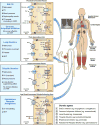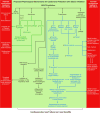Sodium Glucose Cotransporter-2 Inhibition in Heart Failure: Potential Mechanisms, Clinical Applications, and Summary of Clinical Trials - PubMed (original) (raw)
Review
Sodium Glucose Cotransporter-2 Inhibition in Heart Failure: Potential Mechanisms, Clinical Applications, and Summary of Clinical Trials
Yuliya Lytvyn et al. Circulation. 2017.
Abstract
Despite current established therapy, heart failure (HF) remains a leading cause of hospitalization and mortality worldwide. Novel therapeutic targets are therefore needed to improve the prognosis of patients with HF. The EMPA-REG OUTCOME trial ([Empagliflozin] Cardiovascular Outcome Event Trial in Type 2 Diabetes Mellitus Patients) demonstrated significant reductions in mortality and HF hospitalization risk in patients with type 2 diabetes mellitus (T2D) and cardiovascular disease with the antihyperglycemic agent, empagliflozin, a sodium glucose cotransporter 2 (SGLT2) inhibitor. The CANVAS trial (Canagliflozin Cardiovascular Assessment Study) subsequently reported a reduction in 3-point major adverse cardiovascular events and HF hospitalization risk. Although SGLT2 inhibition may have potential application beyond T2D, including HF, the mechanisms responsible for the cardioprotective effects of SGLT2 inhibitors remain incompletely understood. SGLT2 inhibition promotes natriuresis and osmotic diuresis, leading to plasma volume contraction and reduced preload, and decreases in blood pressure, arterial stiffness, and afterload as well, thereby improving subendocardial blood flow in patients with HF. SGLT2 inhibition is also associated with preservation of renal function. Based on data from mechanistic studies and clinical trials, large clinical trials with SGLT2 inhibitors are now investigating the potential use of SGLT2 inhibition in patients who have HF with and without T2D. Accordingly, in this review, we summarize the key pharmacodynamic effects of SGLT2 inhibitors and the clinical evidence that support the rationale for the use of SGLT2 inhibitors in patients with HF who have T2D. Because these favorable effects presumably occur independent of blood glucose lowering, we also explore the potential use of SGLT2 inhibition in patients without T2D with HF or at risk of HF, such as in patients with coronary artery disease or hypertension. Finally, we provide a detailed overview and summary of ongoing cardiovascular outcome trials with SGLT2 inhibitors.
Keywords: clinical trial; heart failure; sodium glucose transporter 2.
© 2017 American Heart Association, Inc.
Figures
Figure 1. Diuretic agents, their mechanisms of action and potential impact in patients with HF
HF = heart failure; SGLT2i = sodium glucose co-transporter 2 inhibitor; PV = pressure volume; CV = cardiovascular; HHF = hospitalization for heart failure; LV = left ventricular.
Figure 2
Hazard ratio and 95% confidence intervals for outcomes examined in EMPA-REG Outcome, CANVAS, LEADER and SUSTAIN 6. CV = cardiovascular; CI = confidence interval
Figure 3. Integrated Physiological Basis for Proposed Mechanisms Leading to Cardiorenal Benefits and Risks Associated with Sodium Glucose Cotransport-2 Inhibition
* = only reported in the CANVAS Program; RAGE = receptor for advanced glycation end products; PTH = parathyroid hormone; FGF-23 = fibroblast growth factor 23; Na+ = sodium; AKI = acute kidney injury.
Comment in
- Response by Lytvyn et al to Letter Regarding Article, "Sodium Glucose Cotransporter-2 Inhibition in Heart Failure: Potential Mechanisms, Clinical Applications, and Summary of Clinical Trials".
Lytvyn Y, Bjornstad P, Udell JA, Lovshin JA, Cherney DZI. Lytvyn Y, et al. Circulation. 2018 May 1;137(18):1984-1985. doi: 10.1161/CIRCULATIONAHA.117.033238. Circulation. 2018. PMID: 29712705 Free PMC article. No abstract available.
Similar articles
- Can we go beyond surrogates?
Drexler A. Drexler A. J Diabetes. 2017 Nov;9(11):976-977. doi: 10.1111/1753-0407.12583. J Diabetes. 2017. PMID: 28692750 - Empagliflozin for Type 2 Diabetes Mellitus: An Overview of Phase 3 Clinical Trials.
Levine MJ. Levine MJ. Curr Diabetes Rev. 2017;13(4):405-423. doi: 10.2174/1573399812666160613113556. Curr Diabetes Rev. 2017. PMID: 27296042 Free PMC article. Review. - Rationale for the Early Use of Sodium-Glucose Cotransporter-2 Inhibitors in Patients with Type 2 Diabetes.
Handelsman Y. Handelsman Y. Adv Ther. 2019 Oct;36(10):2567-2586. doi: 10.1007/s12325-019-01054-w. Epub 2019 Aug 23. Adv Ther. 2019. PMID: 31444707 Free PMC article. Review. - Renoprotective effects of sodium-glucose cotransporter-2 inhibitors.
Heerspink HJL, Kosiborod M, Inzucchi SE, Cherney DZI. Heerspink HJL, et al. Kidney Int. 2018 Jul;94(1):26-39. doi: 10.1016/j.kint.2017.12.027. Epub 2018 May 5. Kidney Int. 2018. PMID: 29735306 Review. - Class effects of SGLT2 inhibitors on cardiorenal outcomes.
Kluger AY, Tecson KM, Lee AY, Lerma EV, Rangaswami J, Lepor NE, Cobble ME, McCullough PA. Kluger AY, et al. Cardiovasc Diabetol. 2019 Aug 5;18(1):99. doi: 10.1186/s12933-019-0903-4. Cardiovasc Diabetol. 2019. PMID: 31382965 Free PMC article. Review.
Cited by
- Underlying mechanisms of ketotherapy in heart failure: current evidence for clinical implementations.
Liu K, Yang Y, Yang JH. Liu K, et al. Front Pharmacol. 2024 Oct 24;15:1463381. doi: 10.3389/fphar.2024.1463381. eCollection 2024. Front Pharmacol. 2024. PMID: 39512825 Free PMC article. Review. - Mechanism of the cardioprotective effect of empagliflozin on diabetic nephropathy mice based on the basis of proteomics.
Yu Z, Lu Y, Zhang M, Lin Y, Wong TS, Guan B, Meng Y, Hu B, Liu FN, Yin L, Li Y, Zhang H, Tang D, Dai Y. Yu Z, et al. Proteome Sci. 2024 Oct 19;22(1):9. doi: 10.1186/s12953-024-00232-1. Proteome Sci. 2024. PMID: 39427190 Free PMC article. - Exploring the mortality and cardiovascular outcomes with SGLT-2 inhibitors in patients with T2DM at dialysis commencement: a health global federated network analysis.
Wang CA, Lin LC, Chen JY, Wang WJ, Wu VC. Wang CA, et al. Cardiovasc Diabetol. 2024 Sep 3;23(1):327. doi: 10.1186/s12933-024-02424-7. Cardiovasc Diabetol. 2024. PMID: 39227933 Free PMC article. - Impact of sodium-glucose cotransporter-2 inhibitor use on peak VO2 in advanced heart failure patients.
Desai A, Sharma S, Abuah N, Jang J, Desai S, Paghdhar S, Goswami RM. Desai A, et al. Front Cardiovasc Med. 2024 Jul 24;11:1376645. doi: 10.3389/fcvm.2024.1376645. eCollection 2024. Front Cardiovasc Med. 2024. PMID: 39114558 Free PMC article. - Effect of dapagliflozin on readmission and loop diuretics use in patients with acute heart failure: a retrospective propensity score-matched cohort study.
Wu D, Ma Z, Wang X, Wang X, Wang X. Wu D, et al. BMC Cardiovasc Disord. 2024 Aug 2;24(1):402. doi: 10.1186/s12872-024-04078-5. BMC Cardiovasc Disord. 2024. PMID: 39090542 Free PMC article.
References
- Metra M, Carubelli V, Ravera A, Stewart Coats AJ. Heart failure 2016: still more questions than answers. Internationalj cardiology. 2017;227:766–777. - PubMed
- AbdAlla S, Lother H, el Massiery A, Quitterer U. Increased AT(1) receptor heterodimers in preeclampsia mediate enhanced angiotensin II responsiveness. Nat Med. 2001;7:1003–1009. - PubMed
- Kannel WB, Hjortland M, Castelli WP. Role of diabetes in congestive heart failure: the Framingham study. Am J Cardiol. 1974;34:29–34. - PubMed
Publication types
MeSH terms
Substances
LinkOut - more resources
Full Text Sources
Other Literature Sources
Medical
Research Materials
Miscellaneous


